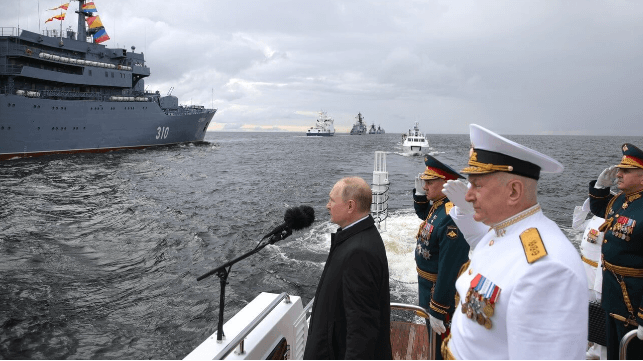Putin Identifies United States as Russia's Primary Naval Opponent

On Sunday, Russia's Navy Day, Russian President Vladimir Putin signed a revised naval doctrine which recognizes the United States as the primary threat to Russian maritime ambitions.
The document describes "the strategic policy of the U.S. to dominate the world's oceans" as a major threat to Russian interests. The claim has an element of truth: American naval doctrine does incorporate the Mahanian objective of global "command of the sea," and the U.S. 2020 Tri-Service Maritime Strategy revives this time-honored doctrine with "a renewed emphasis on sea control." In addition to de facto sea control in most regions, the U.S. has an 80-year track record of countering Russian naval power - as demonstrated by the sinking of the Moskva, which was aided by U.S. battlefield intelligence.
America's naval doctrine also recognizes Russia as a near-peer competitor. The Tri-Maritime Strategy identifies the Russian military's "increasingly aggressive behavior" and "increasing sophistication," but ranks the Russian threat in second place, behind China. The U.S. Navy considers China's PLA Navy and its surrogates to be "the most pressing, long-term strategic threat" to U.S. maritime interests.
Putin's newly-signed doctrine also emphasizes shipbuilding infrastructure in the Russian far east; sustaining Russian control over the Northern Sea Route; maintaining the Russian naval presence in the Mediterranean; and starting a new ferry service to Kaliningrad to improve its commerce with contiguous Russia.

that matters most
Get the latest maritime news delivered to your inbox daily.
At the signing ceremony, Putin also said that the Russian Navy will be taking delivery of its new Zircon hypersonic missiles within a few months' time. The Zircon is a maneuvering hypersonic anti-ship cruise missile, and its extreme speed (Mach 8) and low-observable characteristics are believed to pose a potent threat. It has been test-fired from the frigate Admiral Gorshkov and from the attack sub Severodvinsk, according to the Russian Ministry of Defense.
Separately, in Russian-occupied Sevastopol, a drone strike hit the headquarters of Russia's Black Sea Fleet, according to Russian-backed regional governor Mikhail Razvozhayev. The improvised drone munition injured six employees of the fleet and cast a pall over a planned celebration for Russia's Navy Day; organized Russian Navy festivities in Sevastopol were canceled as a precautionary measure. Militarized recreational drones are widely used by Ukrainian forces, and high levels of partisan activity have been reported in neighboring Kherson Oblast.
